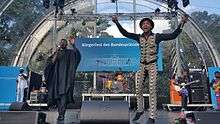Bantu (band)
| BANTU | |
|---|---|
 | |
| Background information | |
| Also known as | Brotherhood Alliance Navigating Towards Unity |
| Origin | Lagos, Nigeria |
| Genres | Afrofunk, Hiphop, Afrobeat, Highlife music |
| Years active | 1999-present |
| Labels | Soledad Productions |
| Website |
www |
BANTU is a 13-piece band based in Lagos, Nigeria. Their music is a fusion of Afrobeat, Hiphop, Afrofunk, Highlife and Yoruba music. The group features multi-instrumentalists and singers who perform as a collective.
History
Nigerian-German brothers Ade Bantu & Abiodun, Sierra Leonean-German-singer Patrice and Nigerian singer Amaechi Okerenkwo founded Bantu[1] in 1996 in Cologne, Germany. BANTU is an acronym for Brotherhood Alliance Navigating Towards Unity and according to band member Ade Bantu the name was also chosen to honour South African anti- apartheid activist Steve Bantu Biko.[2] The band’s first single was "No Vernacular (Humber Version)" which they released on the Cologne Carnival compilation HUMBA 2 in 1996. Their debut album "Fufu" was released in 2000 and it became an instant success in Nigeria earning them two radio hit singles: "Nzogbu" (featuring Trinidadian Rapso artist Brother Resistance) and "Fire Inna Dancehall". After the departure of Amaechi and Patrice from the band a second self titled album "Bantu" featuring Jamaican drummer Sly Dunbar, Peter Tosh guitarist Earl "Chinna" Smith, Positive Black Soul and Pee Froiss from Senegal was released in 2004 with Ade Bantu & Abiodun handling most of the vocal duties.[3][4] In 2005 Bantu was awarded the Kora Awards (the Pan African equivalent of the Grammies) in the categories “Best Group West Africa” & “Best Group Africa” for their third album release “Fuji Satisfaction- Soundclash In Lagos” a collaborative effort that featured Nigerian Fuji music singer Adewale Ayuba. In 2011 Bantu released their fourth studio album titled “No Man Stands Alone” [5][6] an album of collaborations mostly recorded in Nigeria. The album featured Highlife music legend Fatai Rolling Dollar, Nigerian singer Sound Sultan and Nigerian-German singer Nneka amongst many others. Since 2013 the Bantu collective has been hosting a monthly live music concert series Afropolitan Vibes at Freedom Park, a former colonial prison in Lagos Island.[7]
Collaborations
BANTU's broad musical scope has led to an extensive list of collaborations across all genres of music. They have recorded with the likes of British reggae group UB40, German Reggae artist Gentleman, Afrobeat co-founder Tony Allen, jùjú musician Ebenezer Obey, Juju artist Dele Ojo, Highlife singer Paulson Kalu, Nigerian actor and folk singer Jimi Solanke, Schäl Sick Brass Band and the Berlin based Afrobeat Academy Band.[8]
Awards and nominations
BANTU was awarded the Kora Awards in the categories “Best Group West Africa” & “Best Group Africa” for their album “Fuji Satisfaction- Soundclash In Lagos” in 2005 in Durban, South Africa.[9]
BANTU's single "Where Di Water" was nominated for the 2009 Channel O Music Video Awards in the category "Best Ragga Dancehall Video [10]
Band members
- Ade Bantu (Vocals)
- Mide Martins (Vocals)
- Ireoluwa Ayodele Allen (Vocals)
- Damilola Williams (Vocals)
- Peter Sadibo (Bassguitar)
- Dare Odede (Drums)
- Akinkunmi Olagunju (Talking Drums)
- Olufemi Sanni (Guitar)
- Opeyemi Oyewande (Trumpet)
- Dotun Bankole (Saxophone)
- Isaiah Oladele (Trumbone)
- Babajide Okays (Keyboards)
- Abiodun Wurasamba Oke (Percussions)
Discography
- 1999 Fufu (Kennis Music Nigeria)
- 2004 Bantu (Nitty Gritty Music/ Rough Trade)
- 2005 Fuji Satisfaction (Piranha Rec)
- 2008 Bantu (X3M Music, Nigeria)
- 2011 No Man Stands Alone (Pako Records)
External links
References
- ↑ UHAKHEME, OZOLUA (29 July 2014). "Music became therapy when my father was murdered". The Nation Newspaper. Lagos,Nigeria. Retrieved 21 November 2007.
- ↑ "'Why I relocated to Nigeria' – Ade Bantu". Encomium Weekly. Lagos, Nigeria. 8 August 2011. Retrieved 7 September 2015.
- ↑ UHAKHEME, OZOLUA (29 July 2014). "Music became therapy when my father was murdered". The Nation Newspaper. Lagos,Nigeria. Retrieved 21 November 2007.
- ↑ "Funkhaus Europa Global Pop Lexikon Ade Bantu". Funkhaus Europa.access date 27 June 2016
- ↑ Agbede, Terh (11 November 2011). "Bantu: Exhibiting talent, energy, benevolence". National Mirror. Lagos, Nigeria. Retrieved 18 September 2012.
- ↑ "Ade Bantu – Surprising Europe". Al Jazeera English. Doha, Qatar. 8 August 2011. Retrieved 18 September 2012.
- ↑ Mark, Monica (29 July 2014). "West Africa Afrobeat uprising musicians Afropop big-band political spirit". The Guardian. London, United Kingdom. Retrieved 25 November 2014.
- ↑ Keazor, Ed (1 December 2014). "The Ade Bantu Conversation". Music In Africa. Johannesburg, South Africa. Retrieved 26 June 2015.
- ↑ "Winners of 2005 Kora Award". Kora Awards. South Africa. 28 June 2016.
- ↑ TV South Africa: 2009 Channel O Awards Nominees